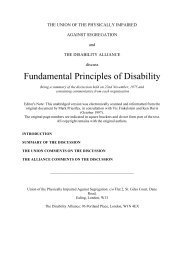Global-Report-Living-Colour-dr2-2
Global-Report-Living-Colour-dr2-2
Global-Report-Living-Colour-dr2-2
You also want an ePaper? Increase the reach of your titles
YUMPU automatically turns print PDFs into web optimized ePapers that Google loves.
Inclusive Communities = Stronger Communities<br />
GLOBAL REPORT ON ARTICLE 19: THE RIGHT TO LIVE AND BE INCLUDED IN THE COMMUNITY<br />
87<br />
to pay privately. The incentives are clearly in the<br />
wrong place and as with many places, it is a matter of<br />
decision making, a clear violation of the intent of<br />
Article 19, from a country that has ratified the<br />
Convention.<br />
In Israel families and people with intellectual<br />
disabilities have an array of choices, running the<br />
spectrum from very segregated to inclusive, with (as<br />
of 2009) over 7,000 people with all kinds of disabilities<br />
living in large residential institutions. Where a person<br />
lives is a function of when they started to receive<br />
services more than a function of their wants and<br />
needs. Inclusion International’s member organization<br />
AKIM, provides a range of places for people to live<br />
from apartments with six people in regular residential<br />
neighborhoods, to hostels with over twenty residents.<br />
Public policy in Israel currently supports six people<br />
living together, no fewer, and while many of the<br />
people become friends, would they have chosen to<br />
live together given the freedom to choose between<br />
more meaningful options?<br />
In Central and Eastern Europe including countries of<br />
the Commonwealth of Independent States (CIS) there<br />
is reliance on large institutions for people with<br />
intellectual disabilities. The Deinstitutionalization and<br />
Community <strong>Living</strong> – Outcomes and Costs: <strong>Report</strong><br />
(DECLOC) showed that over one million people with<br />
disabilities live in institutions. 8 The actual number<br />
may be higher because of the local control of<br />
institutions in many countries and “under the table”<br />
arrangements to admit people. Yet it does not have<br />
to be this way. In Croatia, The Association for<br />
Promoting Inclusion, API, is helping people who had<br />
spent their lives in residential institutions move into<br />
regular housing in the community. They are also<br />
helping other organizations start programmes to<br />
support people with intellectual disabilities and<br />
families in communities throughout the region. Soon,



